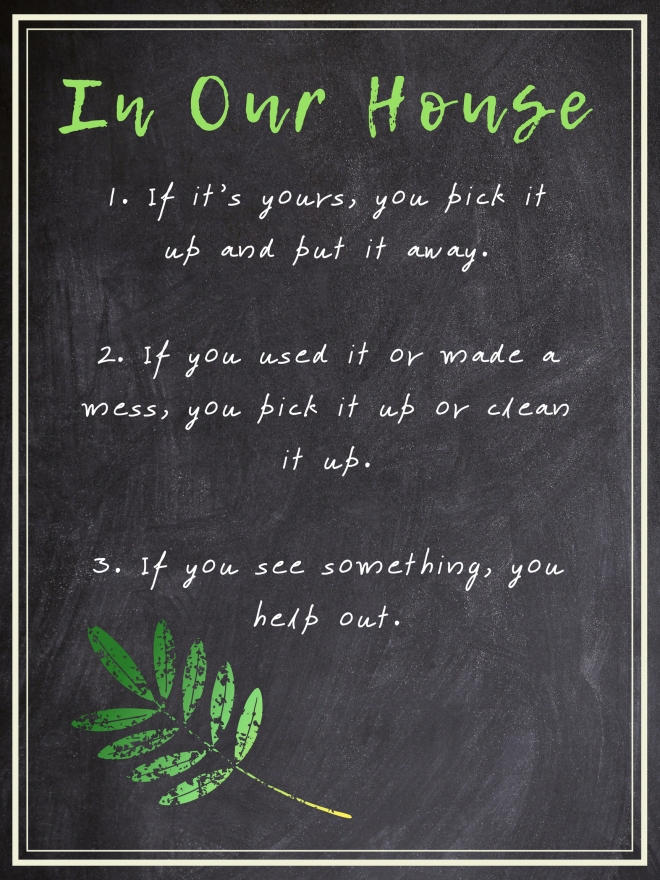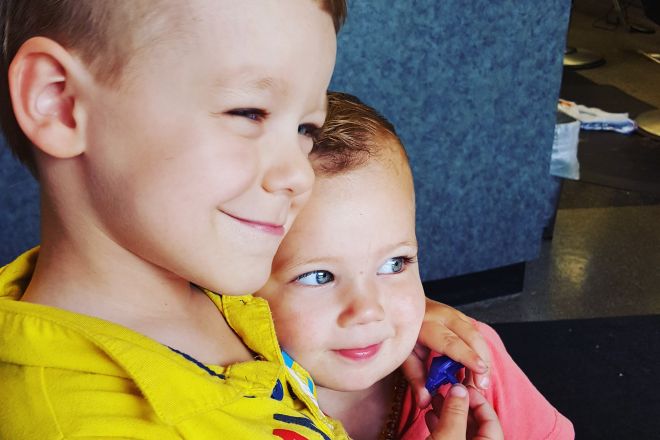We’re trying something new in our house: Fuck Off Time. (Granted, we have to avoid saying its name it front of our toddler, who has dropped a couple of proper-context F-bombs in the last week or so. Oops. Cue the judgment here, I guess).
I mentioned in a recent post that my partner and I both feel every day like we’re “on duty” from the minute we wake up until the minute the kids are in bed. Yes, he gets the ride to and from work by himself, plus his break at work, and I get the time when our baby is napping ‘to myself’. But we both know, as workers, that a commute doesn’t really count as “off” time, and we know as parents that neither does a child’s nap, since it can end at any moment and you’re still “on duty.” No, we were both craving some true off duty time. Time when we were not in charge of anyone and had no obligations. In short, time when we could Fuck Off and do what we wanted. Essentially, the kind of time we used to have in abundance (but which we never truly appreciated!) before we had kids.
Sounds glorious, doesn’t it?
We took a look at our daily routine and determined there was only one time where it would really even be possible for one of us to Fuck Off: dinner prep time. This would mean that one person would have to handle double-kid-duty and dinner prep each night so the other person could Fuck Off, and we would alternate. As parents who had fallen generally into a 1:1 parent-to-kid system of childcare since our second son was born, this seemed pretty ambitious. I should mention that of late, dinner prep time often coincides with a feeding for R and whining/tantrumming from A. We decided to try it for a week and see if it was possible, or if it was just too much.
The rules of Fuck Off Time are simple:
- One person makes dinner and cares for both kids at the same time.
- The other person Fucks Off and has zero obligation to get anything productive done, but they can if they want to (like actually want to – note the italicized, bolded bits there).
- If someone (ie: me) has to feed R during her Fuck Off time, she can do so in the basement watching something on Netflix, and then return R to Dad.
- If we eat somewhere else or if Fuck Off time is not possible on a given day, we simply pause the alternating and pick up the next day where we left off.
I’m happy to report it has been two weeks and so far it is the Best. Thing. We. Have. Done. At least in a while. Here are a few reasons why it is awesome:
1. It teaches our kids about daily life and getting things done.
With our usual 1:1 approach, there’s almost always a parent available to play. With Fuck Off Time, our kiddos have to entertain themselves a bit more. Our toddler, A, can choose to play by himself or help with dinner. I’ve been impressed with how helpful a two-year-old can be in the kitchen, and when he plays by himself, I love listening to his dramatically narrated stories about train crashes and “Who can help?!”, especially when he makes the trains say “Thank you” to each other (I’m hoping this unprompted politeness balances out those F-bombs?). 
9-month-old R is making friends with his pack ‘n play (I only recently discovered that parents of yore used this invention for, you know, PLAY, and not just sleeping away from home). He simultaneously learns to be okay with being alone for a short time, and also gets an opportunity to play with his toys without A taking them away when they look like too much fun.
I want my kids to learn that everyone – even mom and dad! – needs time to do what they like, and that sometimes, they have to be okay with not being the centre of attention because shit just needs to get done. I feel like Fuck Off Time gives them a little, manageable dose of that every day.
2. My on-duty time gets a fresh sense of purpose.
Dinner prep used to be one of my least favourite times of day. I’d procrastinate, avoid thinking about it, and way too often, I’d get to 5pm and go, “oh, crap! what’s for dinner?” It was rushed, haphazard, and just generally sucked. Now I know when “my day” is on, and I get kind of pumped about planning what we’ll have (with a picky eater, a toddler, a vegetarian, and allergies to nuts, dairy, and various fruits/veggies at our table, it’s sometimes a fair challenge to be varied enough for interest and make sure there’s something on the table everyone can/will eat). Sometimes I do some prep in the afternoon, and I try to think of a fun activity A hasn’t gotten out in awhile to suggest for him for while I’m cooking.
I get to feel a bit like super-mom every other day for successfully taking care of two kids and cooking at the same time (I know, I don’t have super high standards, but the kitchen isn’t my forte, okay?).
3. My partner and I each get to give each other a much-needed gift a few times a week.
The On Duty person gets to give their partner the gift of the ultimate luxury: saying,”I got this; you can go Fuck Off,” with a big smile. Fuck Off Time all to oneself… seriously, is there anything more romantic one parent can give the other? The lucky parent then gets to return from this blissful time to a thoughtfully-made meal (and some days, copious amounts of hummus, cheese, fresh veggies, and bread totally counts as a meal, by the way, at least in my house).
The Fucking Off partner gets to give the gift of true appreciation for what their co-parent is doing. It’s harder to see the work your partner’s doing when you both feel like it’s all-hands-on-deck and you’re both run down. The sincerely grateful “thanks for making dinner, honey; this looks great!” that now gets offered on a daily basis in our house is completely lovely.
4. I sometimes CHOOSE productivity, and am TRULY happy about it!
In the last two weeks, I finally bought clear plastic bins to put excess toys in, I reorganized our toy room and reduced the number of toys that are out at a time, decluttered our bathroom, stacked firewood in our backyard, and drove around delivering some things we’re done with to friends who want them next.
The biggest difference in how I felt during these tasks was that I didn’t feel rushed or tense through them: the time was actually MINE, and I didn’t have any of my usual mom-guilt about not being “on duty,” because I wasn’t supposed to be. Fuck Off Time = relaxing, even if I’m doing something productive.
5. I get to feel glamourous and/or lazy in the middle of the day!
Watching Netflix and browsing rugs on Pinterest while someone else makes my dinner? Reading my book and drinking hot chocolate while someone else handles that whining? Showering at my own pace AND drying my hair right afterward? Luxury, I tell you! There are all sorts of possibilities for this time… colouring, yoga, working out, writing… and when the weather gets nice again??? A short bike ride, a walk, napping in my backyard under the leafy maples, going to my friend’s house for a quick dip in her new pool (*wink wink, you know who you are, nudge nudge*)… My dreams are endless and the future is bright.

6. Fucking Off makes us better parents when we come back.
Instead of being simply worn down by the time we get to bath/bed, at least one of us is always a little refreshed. We have a renewed patience, interest, and calm to share with our kids as we play, sing, read stories, and get ready for sleep, and I think they can sense the reduced stress in the air at this time, which makes everyone happier.
An important note on comparison: Don’t! I believe this is absolutely essential for Fuck Off Time. And it’s pretty easy to be tempted. Like on Friday, when I’d spent the day with little R and some fellow mom friends while my husband had a grinding day at work, but it was my turn to Fuck Off (yes, it was the BEST day). Or on Saturday when I’d been woken up by babes many times the night before, but my husband got to go for a relaxing RMT appointment in the afternoon, and it was still my night on duty. The Fuck Off time can’t be in any way conditional on “who got what” already today, or yesterday, or last week. It’s either a free gift to each other or it isn’t. If it comes with strings attached or any guilt at all, it’s no good.
I also have to make a huge disclaimer and acknowledgment here that I know I am supremely lucky. My partner and I are in a position right now where we’re both usually home before dinner prep time even starts; I know many parents don’t have this luxury. People work night shifts or irregular shifts or long hours. They have other commitments that keep them busy or away from the home. They have kids with unique needs or situations where independent play without adult assistance is much harder to achieve. And I know that my own luck won’t last forever. Pretty soon, I’ll be heading back to work and things will change in a big way. R might not tolerate being away from me for even a second when I get home from work at, the earliest, 5pm. I simply won’t be able to do any prep for dinner in the afternoons, and will have to think of things further in advance. There will certainly be a lot of house tasks that just haven’t gotten done during the day, which will be nagging for my attention and pushing my buttons. As our kids get older, there will be after-school lessons, carpooling, and homework to juggle, too.
But I hope knowing how good this has been, we’ll continue to find space somewhere in our lives for Fucking Off. Even if it’s only once a week, or a few times a month. Because it’s just too good to not try for.













 Hey Mamas!
Hey Mamas!
 Over the past few weeks, our house has been suffering from a cold that just seems to be bouncing back and forth between the members of our household. This week, our 22-month old son was the main victim. The result was an increase in toddler meltdowns and a pronounced decrease in the quality and quantity of sleep for all of us.
Over the past few weeks, our house has been suffering from a cold that just seems to be bouncing back and forth between the members of our household. This week, our 22-month old son was the main victim. The result was an increase in toddler meltdowns and a pronounced decrease in the quality and quantity of sleep for all of us.
